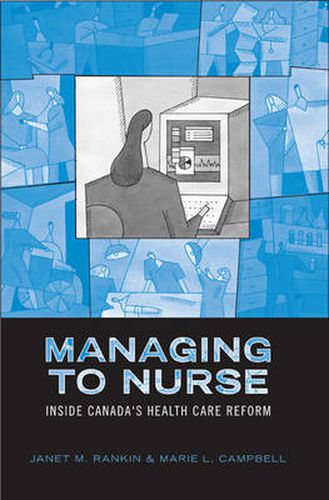Readings Newsletter
Become a Readings Member to make your shopping experience even easier.
Sign in or sign up for free!
You’re not far away from qualifying for FREE standard shipping within Australia
You’ve qualified for FREE standard shipping within Australia
The cart is loading…






How does the contemporary restructuring of health care affect nursing practice? Increasingly since the 1970s, and more intensively under recent reforms, Canadian health care is the focus of information-supported, professionally based management. In Managing to Nurse, Janet M. Rankin and Marie L. Campbell probe the operation of this new form of hospital and its effect management on nurses and nursing.
Written from the nurse’s perspective, this institutional ethnography discovers a major transformation in the nature of nursing and associated patient care: the work is now organized according to an accounting logic that embeds a cost-orientation into care-related activities. Rankin and Campbell illustrate how nurses adapt to this new reality just as they, themselves, perpetuate it - how they learn to recognize their adaptations as professionally correct and as an adequate basis for nursing judgement. Although Managing to Nurse may contradict contemporary beliefs about health care reform, the insiders’ account that it provides is undeniable evidence that nurses’ caring work is being undermined and patient care is being eroded, sometimes dangerously, by current health care agendas.
$9.00 standard shipping within Australia
FREE standard shipping within Australia for orders over $100.00
Express & International shipping calculated at checkout
How does the contemporary restructuring of health care affect nursing practice? Increasingly since the 1970s, and more intensively under recent reforms, Canadian health care is the focus of information-supported, professionally based management. In Managing to Nurse, Janet M. Rankin and Marie L. Campbell probe the operation of this new form of hospital and its effect management on nurses and nursing.
Written from the nurse’s perspective, this institutional ethnography discovers a major transformation in the nature of nursing and associated patient care: the work is now organized according to an accounting logic that embeds a cost-orientation into care-related activities. Rankin and Campbell illustrate how nurses adapt to this new reality just as they, themselves, perpetuate it - how they learn to recognize their adaptations as professionally correct and as an adequate basis for nursing judgement. Although Managing to Nurse may contradict contemporary beliefs about health care reform, the insiders’ account that it provides is undeniable evidence that nurses’ caring work is being undermined and patient care is being eroded, sometimes dangerously, by current health care agendas.